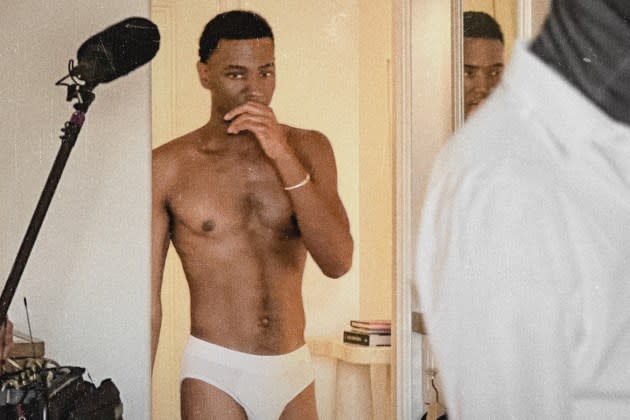HBO’s ‘Jerrod Carmichael Reality Show’ Examines the Comedian’s Coming Out With Uncomfortable Intimacy: TV Review

Stand-up comedy is a public performance that gives the illusion of intimate spontaneity. This is equally true of reality television, so it’s natural that a master at the former would try his hand at the latter. Such is the origin story of “Jerrod Carmichael Reality Show,” a self-reflexive — and self-explanatory — HBO project that follows Carmichael’s award-winning special “Rothaniel” with an even more extended look at the comic’s later-in-life coming out and its effect on his closest relationships. Just don’t call the series unfiltered. “This is not truth,” a friend reminds Carmichael, and by extension, us. “This is narrative.”
“Jerrod Carmichael Reality Show” is not the first time a professional jokester has blurred the line between entertainment and actual life. Carmichael himself cites “The Truman Show” as an inspiration; more recently, works like Nathan Fielder’s “The Rehearsal” and Bo Burnham’s “Inside” have called attention to their own artificial nature, whether to interrogate the ethics of simulating truth for mass consumption (“The Rehearsal”) or highlight how social media has turned everyone into the stars of their own self-produced show (“Inside”). Burnham himself is a longtime collaborator of Carmichael’s, having directed both “Rothaniel” and earlier special “8.” The skeptical friend quoted above may wear a ski mask, use voice distortion and be credited as “Anonymous,” but his silhouette and cadence are both recognizably Burnham’s.
More from Variety
Created by Carmichael, Ari Katcher and Eli Despres, “Jerrod Carmichael Reality Show” does gesture at more cerebral concerns, but it’s ultimately less interested in making a broader statement about its format than using that format to unpack Carmichael’s specific and ongoing hangups. “Cameras make me feel more comfortable,” Carmichael explains, so he aims to use hem to ease into topics that make him deeply uncomfortable, from friendship to romantic partnership to infidelity to, ultimately, his parents. The complicated family dynamic Carmichael outlined in “Rothaniel” endures: his father maintained a second family in a decades-long deception neither man has come to terms with; his mother, a conservative Christian, can’t accept his homosexuality, driving a wedge into their once-close connection.
Beginning in September 2022, “Jerrod Carmichael Reality Show” intersperses scenes from Carmichael’s daily life with confessional comedy sets filmed in the same style as “Rothaniel,” framing a seated Carmichael in close-up as he engages the audience in conversational back-and-forths. The effect is similar to an episode of “Seinfeld” or “Louie,” where the content of the comedy riffs on and resonates with the themes of the plot — except this plot is unscripted. All eight episodes are organized into discrete, digestible topics, whether an event (Carmichael attends the Emmys, Carmichael takes a road trip with his dad) or a person (two friends less camera-shy than Burnham, one from childhood and one from comedy, each get a spotlight). Such neat division adds to the sense we’re watching a highly mediated version of Carmichael’s life, a feeling that can work to the show’s advantage so long as it’s deployed with intention.
The friendship episodes are the season’s weakest by far, both self-contained adventures in which Carmichael intervenes in a loved one’s professional life. Their resolutions are unconvincingly tidy, their subject matter too separate from Carmichael’s strategic solipsism. This is Carmichael’s circus, and can only have its intended effect of public reflection only with the ringmaster at its center. Carmichael has discussed falling for his best friend in his act; the show reveals that friend to be rapper Tyler, the Creator, who then lets Carmichael down gently as an entire production crew looks on. One member admits they’ve blocked out the sun so the room’s light doesn’t shift as the pair awkwardly sort through their emotions.
These intensely personal moments pile up over time, though the fourth wall grows less porous as Carmichael’s inner circle gets used to the experiment. Carmichael sucks the toes of a casual hookup during a postcoital debrief. Carmichael agrees to let his mother pray he’ll stop being attracted to men. Despres is a co-creator of “Couples Therapy,” and sure enough, when Carmichael and his novelist boyfriend Michael go to therapy to address his serial philandering, the production goes with them. In a gut-twisting act of art bleeding into life, Michael realizes Carmichael’s stepped out again when he brings up monogamy and the operator instantly zooms in on his partner’s face. The show as a whole may be a produced package, but parts of it are undeniably authentic, for better or for worse.
Most authentic of all is that “Jerrod Carmichael Reality Show” doesn’t resolve in a definitive fashion. The season spans just over a year. In that time, Carmichael’s mother opens her mind, but not enough to believe homosexuality isn’t a choice; Carmichael gets closer to a sustainable relationship, but there’s no guarantee he’ll never break Michael’s trust again. Nor does Carmichael present himself as especially admirable for opening up in this way. “You treat the camera like a god,” Burnham warns, and there’s a palpable discomfort in watching a professional communicator confront relative amateurs like his parents, who can’t answer back as eloquently. Carmichael is going through a highly unusual version of a relatively common experience. “Jerrod Carmichael Reality Show” may not be a relatable treatise on what it means to come out, but it’s an indelible, candid-in-its-way snapshot of this coming out.
The first episode of ‘Jerrod Carmichael Reality Show’ will air on HBO and be available to stream on Max on March 29 at 8pm PT, with remaining episodes airing weekly on Fridays.
Sign up for Variety’s Newsletter. For the latest news, follow us on Facebook, Twitter, and Instagram.

